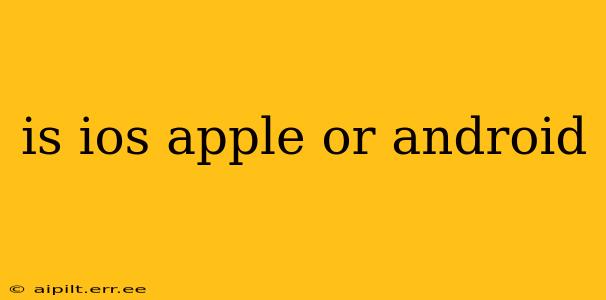The question, "Is iOS Apple or Android?" is easily answered: iOS is Apple's mobile operating system. It's the software that powers iPhones, iPads, and iPod touches. Android, on the other hand, is a mobile operating system developed by Google and used by a wide range of manufacturers, including Samsung, Google, OnePlus, and many others. The two are distinct and competing operating systems, each with its own strengths and weaknesses.
What are the key differences between iOS and Android?
This is a common question, and the answer lies in several key areas:
-
User Interface: iOS boasts a clean, intuitive, and minimalist user interface, known for its ease of use and consistent design. Android offers more customization options, allowing users to personalize their home screens, widgets, and overall look and feel. This flexibility is a key differentiator.
-
App Ecosystem: Both iOS and Android have massive app stores, the App Store and Google Play Store respectively, offering millions of apps. However, the quality control and curation on the App Store are generally considered stricter, leading to a reputation for fewer malicious apps. Android's open nature allows for more diverse app availability but also presents greater risk.
-
Hardware Integration: iOS is tightly integrated with Apple's hardware ecosystem. This seamless integration ensures optimal performance and a consistent user experience across Apple devices. Android, being open source, is used by various manufacturers with differing hardware specifications, leading to a wider range of device experiences, some better than others.
-
Customization and Openness: As mentioned previously, Android's open-source nature allows for extensive customization. You can modify almost everything, from launchers and widgets to system settings. iOS, while offering some customization options, is far more restrictive, prioritizing simplicity and ease of use over extreme personalization.
Is iOS better than Android?
There's no single "better" operating system. The best choice depends entirely on individual preferences and priorities. Someone prioritizing simplicity and ease of use might prefer iOS, while someone seeking maximum customization and flexibility might prefer Android.
What are the advantages of iOS?
- Simplicity and Ease of Use: iOS is renowned for its intuitive interface and user-friendly design.
- Strong App Ecosystem: The App Store generally boasts higher-quality apps with robust security measures.
- Seamless Integration with Apple Devices: A unified experience across all Apple devices.
- Excellent Security and Privacy: Apple places a strong emphasis on user privacy and security.
What are the advantages of Android?
- Customization: Android offers a high degree of customization, allowing for personalized user experiences.
- Open Source Nature: This fosters innovation and a wide range of device options.
- Greater Hardware Variety: Android devices are available at a wider range of price points and specifications.
- Wider App Selection (in some categories): While quality control might differ, the Google Play Store often features apps not available on the App Store.
Ultimately, the "best" operating system comes down to individual needs and preferences. Consider what matters most to you—simplicity, customization, cost, app ecosystem—to make an informed decision.
